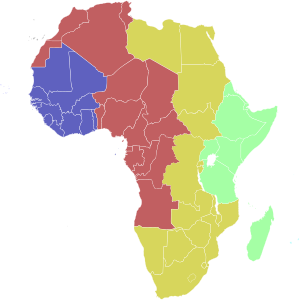
Back توقيت غرينيتش Arabic توقيت جرينيتش ARZ Сярэдні час па Грынвічы BE GMT BE-X-OLD গ্রিনিচ মান সময় Bengali/Bangla GMT BS GMT Catalan Greenwichský střední čas Czech Гринвич вăхăчĕ CV Greenwich Mean Time Danish
| Greenwich Mean Time | |
|---|---|
| Time zone | |
| UTC offset | |
| GMT | UTC±00:00 |
| Current time | |
| 21:32, 18 April 2024 GMT [refresh] | |
| Observance of DST | |
| DST is observed throughout this time zone. | |

| Light Blue | Western European Time / Greenwich Mean Time (UTC) |
| Blue | Western European Time / Greenwich Mean Time (UTC) |
| Western European Summer Time / British Summer Time / Irish Standard Time (UTC+1) | |
| Red | Central European Time (UTC+1) |
| Central European Summer Time (UTC+2) | |
| Yellow | Eastern European Time / Kaliningrad Time (UTC+2) |
| Ochre | Eastern European Time (UTC+2) |
| Eastern European Summer Time (UTC+3) | |
| Green | Moscow Time / Turkey Time (UTC+3) |
| Turquoise | Armenia Time / Azerbaijan Time / Georgia Time / Samara Time (UTC+4) |
▉▉▉ Dark colours: Summer time observed

| Light Blue | Cape Verde Time[a] (UTC−1) |
| Blue | Greenwich Mean Time (UTC) |
| Red | (UTC+1) |
| Ochre | (UTC+2) |
| Green | East Africa Time (UTC+3) |
| Turquoise | (UTC+4) |
b Mauritius and the Seychelles are to the east and north-east of Madagascar respectively.
Greenwich Mean Time (GMT) is the local mean time at the Royal Observatory in Greenwich, London, counted from midnight. At different times in the past, it has been calculated in different ways, including being calculated from noon;[1] as a consequence, it cannot be used to specify a particular time unless a context is given. The term GMT is also used as one of the names for the time zone UTC+00:00 and,[2] in UK law, is the basis for civil time in the United Kingdom.[3][a]
Because of Earth's uneven angular velocity in its elliptical orbit and its axial tilt, noon (12:00:00) GMT is rarely the exact moment the Sun crosses the Greenwich Meridian[b] and reaches its highest point in the sky there. This event may occur up to 16 minutes before or after noon GMT, a discrepancy described by the equation of time. Noon GMT is the annual average (the arithmetic mean) moment of this event, which accounts for the word "mean" in "Greenwich Mean Time".[c]
Originally, astronomers considered a GMT day to start at noon,[d] while for almost everyone else it started at midnight. To avoid confusion, the name Universal Time was introduced in 1928 to denote GMT as counted from midnight.[5][6] Today, Universal Time usually refers to Coordinated Universal Time (UTC) or UT1;[7] English speakers often use GMT as a synonym for UTC.[8] For navigation, it is considered equivalent to UT1 (the modern form of mean solar time at 0° longitude); but this meaning can differ from UTC by up to 0.9 s. The term GMT should thus not be used for purposes that require precision.[9]
The term GMT is especially used by United Kingdom bodies, such as the BBC World Service, the Royal Navy, and the Met Office; and others particularly in Arab countries, such as the Middle East Broadcasting Centre and OSN.
- ^ "Time scales". UCO Lick. Retrieved 28 July 2018.
- ^ "What is Greenwich Mean Time?". Royal Museums Greenwich. 2021. What does GMT stand for?. Retrieved 28 October 2021.
- ^ Cite error: The named reference
IA1978was invoked but never defined (see the help page). - ^ "What is the Prime Meridian and why is it in Greenwich?". Royal Museums Greeenwich. Retrieved 13 December 2021.
The IRM is the only meridian that may now be described as the prime meridian of the world, as it defines 0° longitude by international agreement. The IRM passes 102.5 metres to the east of the historic Prime Meridian of the World at the latitude of the Airy Transit Circle here. The entire Observatory and the historic Prime Meridian now lie to the west of the true prime meridian.
- ^ McCarthy & Seidelmann 2009, p. 17.
- ^ "UTC (Universal Time Coordinated)". Greenwich Mean Time. Retrieved 12 May 2023.
- ^ "Astronomical Almanac Online". Her Majesty's Nautical Almanac Office. 2020. "Glossary" s.v. Universal Time. Archived from the original on 23 February 2022. Retrieved 27 February 2021.
- ^ "Coordinated Universal Time". Lexico UK English Dictionary. Oxford University Press. Archived from the original on 14 June 2020.
- ^ Hilton & McCarthy 2013, pp. 231–232.
Cite error: There are <ref group=lower-alpha> tags or {{efn}} templates on this page, but the references will not show without a {{reflist|group=lower-alpha}} template or {{notelist}} template (see the help page).